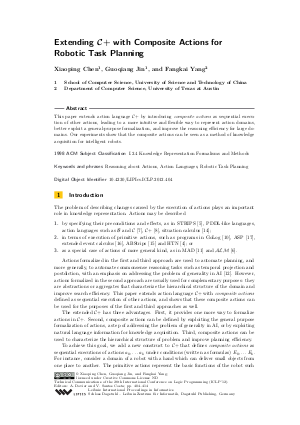Extending C+ with Composite Actions for Robotic Task Planning
Authors Xiaoping Chen, Guoqiang Jin, Fangkai Yang
-
Part of:
Volume:
Technical Communications of the 28th International Conference on Logic Programming (ICLP'12) (ICLP 2012)
Part of: Series: Leibniz International Proceedings in Informatics (LIPIcs)
Part of: Conference: International Conference on Logic Programming (ICLP) - License:
 Creative Commons Attribution-NoDerivs 3.0 Unported license
Creative Commons Attribution-NoDerivs 3.0 Unported license
- Publication Date: 2012-09-05
File

PDF
LIPIcs.ICLP.2012.404.pdf
- Filesize: 0.63 MB
- 11 pages
Document Identifiers
Subject Classification
Keywords
- Reasoning about Actions
- Action Languages
- Robotic Task Planning
Metrics
- Access Statistics
-
Total Accesses (updated on a weekly basis)
0PDF Downloads0Metadata Views
Abstract
This paper extends action language C+ by introducing composite actions as sequential execution of other actions, leading to a more intuitive and flexible way to represent action domains, better exploit a general-purpose formalization, and improve the reasoning efficiency for large domains. Our experiments show that the composite actions can be seen as a method of knowledge acquisition for intelligent robots.
Cite As Get BibTex
Xiaoping Chen, Guoqiang Jin, and Fangkai Yang. Extending C+ with Composite Actions for Robotic Task Planning. In Technical Communications of the 28th International Conference on Logic Programming (ICLP'12). Leibniz International Proceedings in Informatics (LIPIcs), Volume 17, pp. 404-414, Schloss Dagstuhl – Leibniz-Zentrum für Informatik (2012)
https://doi.org/10.4230/LIPIcs.ICLP.2012.404
BibTex
@InProceedings{chen_et_al:LIPIcs.ICLP.2012.404,
author = {Chen, Xiaoping and Jin, Guoqiang and Yang, Fangkai},
title = {{Extending C+ with Composite Actions for Robotic Task Planning}},
booktitle = {Technical Communications of the 28th International Conference on Logic Programming (ICLP'12)},
pages = {404--414},
series = {Leibniz International Proceedings in Informatics (LIPIcs)},
ISBN = {978-3-939897-43-9},
ISSN = {1868-8969},
year = {2012},
volume = {17},
editor = {Dovier, Agostino and Santos Costa, V{\'\i}tor},
publisher = {Schloss Dagstuhl -- Leibniz-Zentrum f{\"u}r Informatik},
address = {Dagstuhl, Germany},
URL = {https://drops.dagstuhl.de/entities/document/10.4230/LIPIcs.ICLP.2012.404},
URN = {urn:nbn:de:0030-drops-36404},
doi = {10.4230/LIPIcs.ICLP.2012.404},
annote = {Keywords: Reasoning about Actions, Action Languages, Robotic Task Planning}
}
